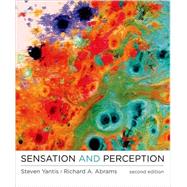- ISBN: 9781464111709 | 1464111707
- Cover: Hardcover
- Copyright: 8/8/2016
Steven Yantis is Professor and Chair of the Department of Psychological and Brain Sciences at Johns Hopkins University, with secondary appointments in the Departments of Cognitive Science and Neuroscience. He studied experimental psychology as an undergraduate at the University of Washington in Seattle, and later he received a PhD in Experimental Psychology at the University of Michigan. Following a year as postdoctoral fellow at Stanford University, he joined the faculty at Johns Hopkins University, where he has been ever since. Yantis has research interests that include visual perception, attention, and cognition. Members of the Yantis laboratory measure behavior (response time, eye movements) and brain activity (functional MRI) as people carry out tasks that probe perception and attention. He has taught a variety of courses in human perception and attention for more than two decades. In Visual Perception: Essential Readings (Psychology Press, 2000), Yantis assembled 25 articles published over 100 years that laid the foundations of the field, and he is the volume editor of the Stevens Handbook of Experimental Psychology (3e): Volume 1: Sensation and Perception (Wiley, 2002). Yantis received the Early Career Award from the American Psychological Association in 1994 and the Troland Research Award from the National Academy of Sciences in 1996.
BRIEF CONTENTS
Chapter 1: Foundations
Chapter 2: Light and the Eyes
Chapter 3: The Visual Brain
Chapter 4: Recognizing Visual Objects
Chapter 5: Perceiving Color
Chapter 6: Perceiving Depth
Chapter 7: Perceiving Motion
Chapter 8: Perception for Action
Chapter 9: Attention and Awareness
Chapter 10: Sound and the Ears
Chapter 11: The Auditory Brain and Perceiving Auditory Scenes
Chapter 12: Perceiving Speech and Music
Chapter 13: The Body Senses
Chapter 14: Olfaction: Perceiving Odors
Chapter 15: Gustation: Perceiving Tastes and Flavors
Chapter 1: FoundationsVignette: "I’m Having a Stroke!" World, Brain, and MindThe Perceptual ProcessThree Main Types of QuestionsHow Many Senses Are There?Evolution and Perception
- Check Your Understanding
- Check Your Understanding
- Check Your Understanding
- Check Your Understanding
- Check Your Understanding
- Check Your Understanding
- Check Your Understanding
- Check Your Understanding
- Check Your Understanding
- Check Your Understanding
- Check Your Understanding
- Check Your Understanding
- Check Your Understanding
- Check Your Understanding
- Check Your Understanding
- Check Your Understanding
- Check Your Understanding
- Check Your Understanding
- Check Your Understanding
- Check Your Understanding
- Check Your Understanding
- Check Your Understanding
- Check Your Understanding
- Check Your Understanding
- Check Your Understanding
- Check Your Understanding
- Check Your Understanding
- Check Your Understanding
- Check Your Understanding
- Check Your Understanding
- Check Your Understanding
- Check Your Understanding
- Check Your Understanding
- Check Your Understanding
- Check Your Understanding
- Check Your Understanding
- Check Your Understanding
- Check Your Understanding
- Check Your Understanding
- Check Your Understanding
- Check Your Understanding
- Check Your Understanding
- Check Your Understanding
- Check Your Understanding
- Check Your Understanding
- Check Your Understanding
- Check Your Understanding
- Check Your Understanding
- Check Your Understanding
- Check Your Understanding
- Check Your Understanding
- Check Your Understanding
- Check Your Understanding
- Check Your Understanding
- Check Your Understanding
- Check Your Understanding
- Check Your Understanding
- Check Your Understanding
- Check Your Understanding
- Check Your Understanding
- Check Your Understanding
- Check Your Understanding
- Check Your Understanding
- Check Your Understanding
- Check Your Understanding
The New copy of this book will include any supplemental materials advertised. Please check the title of the book to determine if it should include any access cards, study guides, lab manuals, CDs, etc.
The Used, Rental and eBook copies of this book are not guaranteed to include any supplemental materials. Typically, only the book itself is included. This is true even if the title states it includes any access cards, study guides, lab manuals, CDs, etc.
Digital License
You are licensing a digital product for a set duration. Durations are set forth in the product description, with "Lifetime" typically meaning five (5) years of online access and permanent download to a supported device. All licenses are non-transferable.
More details can be found here.






